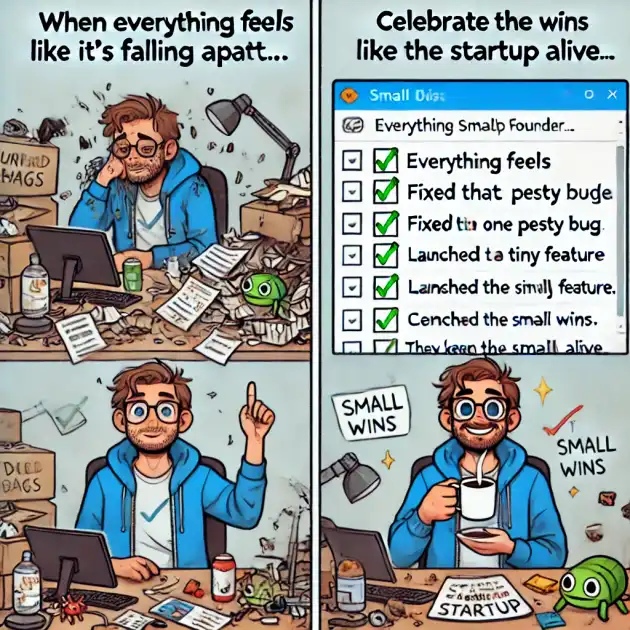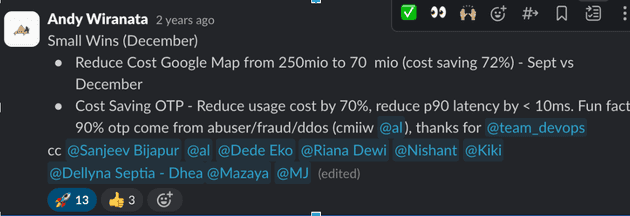The early days are all about building, launching, and trying to catch that first wave of success. But once you’ve got your MVP out there, the real challenge kicks in—how do you keep the momentum going and your personal growth ?. This chapter is about what happens when your startup starts to grow and things get a little more complicated.
It’s about figuring out how to take things to the next level without losing your way.
... When Organization Fail
I've seen multiple startups fail in their early stages. Despite feeling confident in our execution—we built a minimal viable product and launched it—we still failed to attract customers after several months.
Here's what I've learned...
The failures weren't always due to our actions. Sometimes, we were just unlucky or launched at a bad time. The same approach might work if tried again eight months later. There are ton of edge cases and leaky abstractions. It is a complicated system, we live in the world. Events or situations happening that are beyond our control and can't be predicted or planned for, but you can take actions to improve your chances.
The key is to find ways to achieve small wins. Even if you gain just ten paying customers, you gain valuable lessons. You can ask these customers why they bought your product and what else they need. These insights provide numerous opportunities for growth. It's a scenario where success builds on itself. With resources, you start winning more. You're writing code that adds value and building something that people want.
... When Organization Grow
Your organization grow from 8 to 60 engineers. Now, you has more senior engineer/ tech lead / engineering managers that diverse subject matter expert, come from different background. You might be have identity issue. Am i good enough ?
1. Career Progression
If the company succeeds and grows, the founding engineer has several options:
- Grow into the VPE / Engineering Manager role, focusing on technical strategy. If you join as experience engineer in the big company, you can leverage previous experience to bring added value.
- CTO, most likely if not going to happen. Typically, founders seek experienced professionals for this role or you were set as a candidate when first joined. Or, you put your own money into company :p
- A technical lead, if they want to stay close to the code, a technical lead role is best.
- Just Leave
…Just leave, The decision to join startup is full of risk, to do job you working late. You might have to act as the product manager, interfacing with the business unit, trying to figure out what is needed, breaking it down, delivering it, and even going back to the CTO/C-Level to get more help. You become your own manager, your own product manager, and your own engineer all in one package. In other side, you might get rapid career progression and skill acquisition. The exposure to various facets of the business can accelerate your professional growth in ways that few other environments can match. This will be tough on the ego. It’s important to realize what brings you joy in life then "leave" can be one of option if that joy is elsewhere.
2. Listen & Delegate
You are no longer a solo ranger. Previously, you could design, code, commit, and deploy all by yourself while others were busy with their tasks. Now, you have a larger team that requires collaboration. It's time to start training yourself to become a better leader and person. Embrace disagreements, You would be the first contact person because you understand the historical context and might be bombarded with questions from new joiners. This is your opportunity to listen, gather feedback from people with different backgrounds, and start delegating your responsibilities. Set up knowledge transfers, and it may be time to transition from being a generalist to a specialist.
It's like art, but you don't need to become smartest person to be success
3. Make Some Noise
it’s important to keep the original culture of the startup alive and make sure that any new people who join the team share the company’s core values. You, as someone who has been there from the beginning, play an important role in keeping that startup spirit alive. So, don't forget to make the noise. And make the noise means, talk to your manager's manager. Tell them what you did. It means tell the business what you did. Otherwise, start post small wins to broader channel. You has advantage become first committer. You know inside and outside organization and systems, you already built social capital. Use that to your advantage.
As your startup grows, the challenges evolve. What worked in the early stages may no longer be enough. Adaptation is key—whether it’s making noise about your achievements, delegating tasks, or even considering a change in your career path. Success is about continuous learning, adapting, and evolving.

